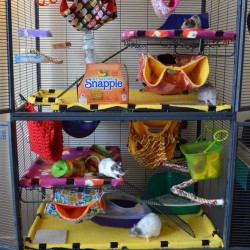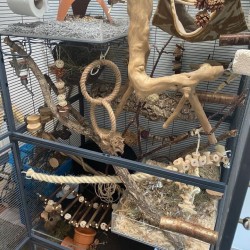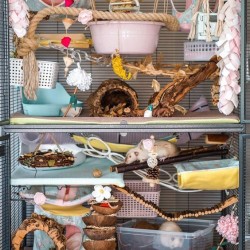Rat Care
Your Guide to Caring for Rats
- Aubrey
- Lemon
- Nadya
Rats have a pretty bad reputation. Filthy, gross, vermin – you name it, they’ve been called it! For many people, “companion” is definitely not the first word that comes to mind when they think about rats.
When you take a closer look, though, we bet you’ll find that rats are amazing animals.
Rats have had a close relationship with people for a long time. Our towns and cities draw them in, providing a constant supply of food and plenty of shelter. So as we moved around the globe, rats followed – and multiplied. In fact, rats outnumber humans on almost every continent in the world!
What began as a relationship of dependence over time became one of companionship. Fascinated by their curiosity, intelligence and resourcefulness, people began to keep tame rats. Eventually, from their wild rat cousins, a range of friendly, domesticated rats emerged – today’s pet rats.
Rats make excellent companions. They are smart and affectionate, not to mention entertaining to watch and hang out with. They each have their own unique personality and are fun to get to know.
So give rats a chance! They might just surprise you.
Rat Statistics
Origin: Asia
Status: Began to be domesticated nearly 200 years ago
Life Span: Usually 2 to 3 years
Size: Weigh up to about 650 g and measure 23 to 28 cm in length (plus an 18 to 23 cm tail)
Coat: Comes in a few “styles,” from smooth to curly
Colour: Many different colours and patterns, like cinnamon or “Dalmatian”
- Zack
- Panther – photo by Willow Bean Photography
- Lasagna
Be a rat-tastic guardian!
Rats require plenty of attention, but they make great companions. Here are just some of the care and welfare needs of rats.
Healthy, happy rodents: Spending time with your rats will show you how they normally look and behave. When you notice something unusual – like breathing problems or loss of appetite – you’ll know to take them to the veterinarian right away.
Please don’t squeeze: Rats love attention, but they must be handled gently and carefully. Always pick up your rat with two hands: one hand under his hind end and the other around his chest. Never pick a rat up by his tail.
Keeping fit: Rats require daily exercise and will happily romp around a room that has been cleared of hazards such as electrical cords, cats or dogs, and poisonous plants. Keep in mind, a rat can squeeze through any opening she can get her head through! So rat-proofing is key. Always supervise playtime.
Rapidly reproducers: Never keep male and female rats together, even for a short period (unless they are neutered or spayed). Rats multiply at an amazing rate. Females can have up to 12 litters in just one year, with anywhere from six to 12 young per litter.
- Mika and Lizzie – photo by Willow Bean Photography
- Adley and Amelia
- Jill Kelly Sabrina
Social life: Rats should not be kept alone! Two or more can live together provided they are the same sex and have a large habitat. For all those hours people are at work or school (or asleep), think how happy your rat will be having a rat friend around! They’ll eat, play and sleep together, and groom each other.
Teeth: To help wear down their ever-growing front teeth, provide your rats with chewing items such as cardboard, wooden toys and apple branches. Make sure the branches come from trees that haven’t been treated with any chemicals.
Litter box: Some rats can be trained to use a litter box, while others may never use one consistently. But it’s worth a try! A plastic cat litter pan works well. You can also use a corner litter pan designed for small animals.
Grooming: Rats are actually great groomers. They spend lots of time each day carefully cleaning themselves – and each other – all over.
- Alto
- Pile-o-rats
- Poe – photo by Willow Bean Photography
Feeding Time
Snack time: Rats love treats! Foods such as unsweetened cereals, seeds, plain popcorn, nuts and dried pasta make great snacks. Just don’t feed too many or you’ll end up with overweight, unhealthy rats.
Being omnivores, rats eat both plant and animal foods. Feed your rats a staple diet of rat seed mix and pellets or blocks. Provide a small amount of vegetables and fruits every day, too. Rats crave variety!
Hoarders: Rats often hoard their food, so be sure to look for hidden stashes. Take away any uneaten fresh food the next day so it doesn’t spoil and make them sick.
Drink up: Rats need water available to them all the time. Fill your rats’ sipper bottle or heavy ceramic dish with clean, fresh water every day. Use soap and water to clean them out – once a week for bottles and daily for dishes.
Recipes for rats: Rats are fun to feed because they clearly take such pleasure in eating! Things like cooked rice, plain oatmeal, scrambled egg and cooked pasta are easy to make and bound to be a hit with your rats. (Just be sure to feed these foods in small amounts. They’re not meant to be a replacement for a well-balanced diet.)
A comfy place to call home
Rat palace: Rats are active animals requiring a large habitat. The more space, the better! Rats like to climb so a tall enclosure with multiple levels is best. A cage measuring three feet long by two feet wide by four feet high (like a Critter Nation cage) works well for a pair or small group of rats. Be sure the bar spacing is no larger than half an inch apart for young rats and an inch apart for adult rats to prevent escape. Habitat bottoms should be solid, not mesh or wire, which can hurt rat feet. Wire shelves should be covered to prevent injuries, too.
- Rat cage ideas
- Rat cage ideas
- Rat cage ideas
Interior decorating: Adding small houses, ropes, hanging toys, plastic cat toys, hammocks, dig boxes, ladders and tubes provides stimulation and places to hide and sleep. Swap items in and out to keep your rats’ cage interesting. Scatter or hang nesting material – like shredded paper – for your rats to gather.
A clean, comfy home: Bedding made from recycled paper or fleece fabric works well for rats. Do not use cedar, pine or aspen wood shavings because they can cause health problems. Clean the cage several times a week to keep your rats healthy. Ammonia from urine can irritate their lungs and lead to illness. Keep the cage in an area protected from cold drafts and direct sunlight, as well as loud noises and bright lights. Rats like darkness!
- Abigail
- Mika – photo by Willow Bean Photography
- Sabrina
Game time!
Rats love to have fun – with each other and with their guardian. Plus, they always seem to have energy to burn! Try challenging your rats with these games:
Bobbing for peas: Fill a shallow dish or bowl with about an inch of water. Pour in some peas. It won’t take long for your rats to figure out how to fish for them!
Obstacle course: Create a jungle gym for your rats. Use PVC pipes, cardboard boxes, wooden ladders, the legs cut off an old pair of jeans – pretty much anything you can think of that your rats will want to explore. Then let ‘em loose and watch your rats climb all over!
Tug-o-war: Rats love to chase things! Wiggle a piece of string or rope in front of them and they’ll try to snatch it from you. Just make sure you let them “win” the tug-fight every once in a while.
Tunnelling for treats: Rats are natural burrowers. Fill a large plastic container with plain potting soil from a garden store. Be sure to place the container on a towel – this is one messy game! Sprinkle and bury some treats around the container. Then sit back and watch your rats have a blast digging for the goodies.
- Casu and Gouda’s babies
- Melody and Harmony
- Zack
Keeping healthy
Not every veterinary clinic offers specialized care for small animals like rats. Rats require a vet who has the expertise to properly treat “exotic” pets to give them the best care possible.
Rat adopters should already have a vet picked out who has the knowledge to care for their new friend – be it for a general health check, or an emergency.
We’ve compiled a list of vets in the Hamilton and surrounding area that we have either used ourselves, or confirmed that the clinic has a vet on staff who is trained in small animal care.
Adopt a rat today!
Sources:
Text – excerpts of “Caring for Rats” by BC SPCA
Photos – rats rescued by Ladybird Animal Sanctuary


































